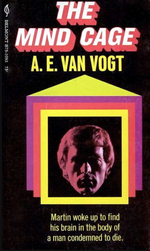Home > A. E. van Vogt > THE 14 VAN VOGT NOVELS ON THIS SITE, in chronological order > "The Mind Cage" (1957) by A. E. van Vogt
 "The Mind Cage" (1957) by A. E. van Vogt
"The Mind Cage" (1957) by A. E. van Vogt
Friday 13 July 2018, by
A brilliant scientist has been condemned to death for suggesting that the collectivist social system of the government that’s on the verge of taking over control of the entire world needs to be seriously called into question, and when his close friend comes to deliver the verdict to him he finds that the scientist has succeeded in escaping — by switching bodies with him! So he will be executed in his place unless he can not only find the escaped scientist but also solve the many mysteries surrounding his condemnation and the very nature of the dictatorship itself.
A considerably extended, and very readable, version of the 1948 story The Great Judge.
(60,500 words)
An e-book is available for downloading below.